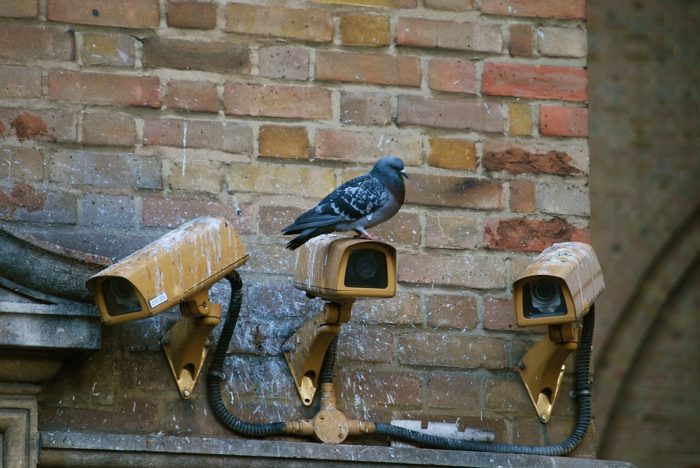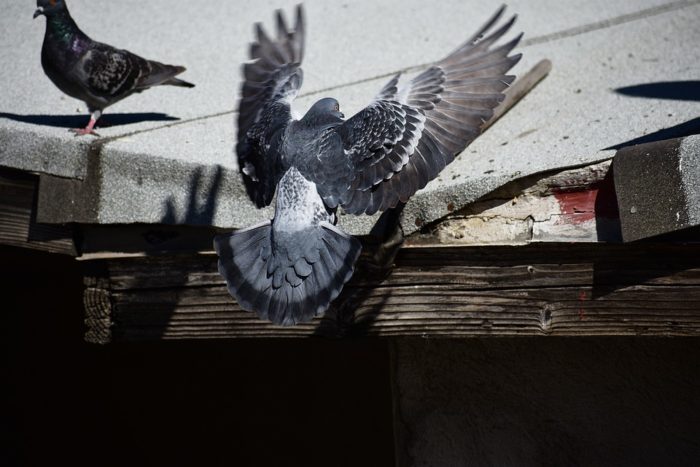Pigeons are labeled as “rats with wings.” Over time, these birds have become unwanted pests.
Imagine the heavy smell of bird feces lingering in the air.
And, to top it all off, those pigeons poo that is aesthetically displeasing in the eyes.
Important Note: If you're tired of pests and want a reliable solution, then you should definitely consider seeking help from a professional pest control company. DIY solutions can be effective, but if you're dealing with a significant pest infestation, you don't want to rely solely on DIY methods. Pest control companies typically don't charge huge fees. You can fill out this form to receive free quotes from the top local pest control companies, and compare the quotes and see for yourself. Then, finally, your pest problems will be eliminated for good.
I know that it is so frustrating to scrape off that bird poo every single time. Well, don’t worry, we got you covered!
This article will let you in on some pro tips in getting rid of pigeons minus the stress and worry.
Today, you’ll learn the practical measures and tips you can adopt to get rid of pigeons without hurting them.
Things that Attract Pigeons
Primarily, pigeons are strongly dependent on people. These birds are labeled as the most common bird pest linked with humans. Most likely, pigeons are attracted to two things: food and favorable habitat.
Pigeons are commonly found on roofs, farmlands, livestock areas, parks, city buildings, warehouses, balconies, and even houses.
These birds quickly adapt and survive in areas where people live. Studies have shown that the number of pigeons in urban towns and cities is higher than in places near forests.

Similarly, pigeons are attracted to houses because there is food and favorable living conditions. These birds will likely feed off crumbs and scraps left in your balconies.
Pigeons will also find it favorable to live on the roof of houses laying and hatching their eggs in there.
These birds are easily tamed and can readily survive in any favorable living conditions. Mainly, pigeons flock to parks and urban places because they are not intimidated by people. Pigeons will blend in and will even take a spot on the bench or pose in front of a camera!
Health-Related Risks
Pigeons are birds that carry transmissible health-related diseases and risks to humans. Studies show that these birds have 13 infectious and bacterial infections.
These include salmonella (salmonellosis) or food poisoning, typhoid, pasteurellosis, streptococcus, and tuberculosis.
These birds also carry fungal diseases such as aspergillosis, blastomycosis, and histoplasmosis. Generally, pigeons are disease vectors.
These birds are primarily vessels of different types of bacteria that can be transferred to human beings. In this case, it is even safer to get rid of pigeons without hurting or killing them.
Economic Problems
Published papers and studies have recorded an estimated 1.1 billion dollars per year are the expense and cost of damage and problems caused by pigeons among people’s roofs, balconies, warehouses, and buildings.
Pigeon droppings and defecation constantly deteriorate and contaminate roofs, balconies, buildings, and warehouses.
This leads to an increased cost of maintenance and management among these areas.
As such, deterrents for pigeons have been increasing in demand. Ranging from repellents to frightening devices, people have been finding ways to deter pigeons from flocking on houses, roofs, balconies, buildings, and warehouses.
Here are some practical measures in deterring the increasing flock of pigeons in or near your places. These pro tips will likely be your best guide in keeping those birds away.
Getting Rid of Pigeons Without Hurting Them
Pigeon control management can vary depending on the laws and policies embedded in your states, cities, or countries.
In the United States, some states prohibit killing, shooting, or even poisoning pigeons. In this case, it is highly advisable to take necessary measures to deter pigeons without hurting or killing them.
Habitat Disturbance
Pigeons are attracted to favorable living conditions. These birds will most likely inhabit your roof or balcony, and they can even survive in buildings and warehouses.
This is why pigeons are attracted to houses because there is food nearby, and the place is highly favorable for their survival.
It is highly recommended to eliminate feeding, roosting, and nesting sites for long-term pigeon control and management.
In your house, especially on your balcony, cleaning up spilled grains or crumbs is advisable to discourage pigeons from flocking in your balcony.
Also, eliminate and dry out pools with stagnant water that these birds can use for watering.
Installing wire mesh to keep birds and pigeons out and away in roofs, buildings, and warehouses are highly advised.
Modify these structures to make them even less appealing for these birds. Pigeons can be excluded by installing wood, metal, and styrofoam to block nesting areas and roosts access.
Roofs should be installed with nylon netting installed on the underside of the rafters to discourage pigeons from nesting in this place.
In warehouses, it is advisable to install porcupine wires. These wires come with stainless-steel prongs that act as sharp points, causing discomfort and deterring the presence of pigeons.

Pigeon Exclusion
Pigeons can be excluded and discouraged in various ways. It is adequate to install a bird barrier in a warehouse or a building.
A bird barrier is a nonlethal mechanical repellent that can exclude pigeons from structures such as buildings and warehouses.
Like porcupine wires, a bird barrier is a stainless steel coil with a base mounting strip attached to the roof of a building or a warehouse.
Another way to exclude pigeons is by installing an electric shock bird control system.
This system works with a cable embedded in plastic and connected with two electrical conductors. These conductors carry an electrical pulse that is nonlethal to pigeons.
When pigeons create contact with this electric shock bird control system, these birds will feel an electrical shock, but it will not kill them, nonetheless.
This device is highly effective as pest control for pigeons. Commonly, these devices have a sustained life span of eight years installed on infrastructures such as buildings and warehouses.
Frightening Devices
Sounding and non-sounding devices have had their fair share of deterring pigeons away from a roof, balcony, a building, and a warehouse.
Noise-making devices that are highly disturbing to humans can have little to no effect in keeping pigeons away from infrastructures.
Non-sounding devices include flags, balloons, plastic owl models, and puppets.
There has been a demand for owl models because pigeons are scared of owls. Owls are predators which frighten pigeons who are the prey.
But, pigeons are intelligent animals. These birds can differentiate between a plastic and a real owl from each other.
Most of these frightening devices have little to no effect in keeping pigeons away. These devices are not fit for long-term use as pest control for pigeons.
But, in the meantime, these frightening devices can be of use when needed for the time being.
Repellents
Pigeons are often attracted to your house’s balcony because of food crumbs and comfortable living conditions that will likely let them survive.
Now, people demand various repellents that will keep these birds away.
Various nonlethal chemical repellents come in aerosols, liquids, and pastes. These repellents are not toxic and deadly to pigeons.
What these repellents do is that they produce a sticky surface when sprayed, say, for example, on your balcony.
These pigeons will dislike the smell of these repellents, and they will likely find another place to settle in.
Before applying these repellents, make sure that the surface is cleaned and protected with waterproof tape.
Most of these repellents will stain and may be difficult to remove on surfaces like the balcony.
An application of a sticky repellent remains effective for six months up to two years.
Some brands have added a protective layer that eventually extends the lifespan of these repellents.
Another repellent effective to deter pigeons is naphthalene. This is a repellent that targets the olfactory sense of pigeons.
When naphthalene evaporates, it produces a strong smell that deters pigeons from enclosed spaces such as the attics.
In the United States, using naphthalene is banned from other states. It is essential to consult your state’s policies before opting for one.
Livestock Area Modification
Pigeons mostly flock to livestock areas because there is an abundance of food and a comfortable habitat.
These birds are drawn to the excess amount of spilled grains and hay habitable for their survival. Among these areas, bird feeders are attractors for pigeons.
It is advisable to buy quality seeds such as sunflower seeds and nuts less pleasing for pigeons. Using bird seeds mixed with corn is like putting a sign saying “pigeon food.”
Also, it is essential to get rid of pigeons at bird feeders. Use feeders that pigeons cannot perch on, such as tube feeders.
Tube feeders are enclosed and have tiny holes for feeding seeds. Pigeons find it hard to feed on seeds greater than ½ inch (1.5 cm).
Also, it is adequate to adjust the feeding times where the pigeons are less active and quick. An advisable feeding time is a late afternoon than early morning or midday.
Final Thoughts
After noting down those tips, I hope you’ll likely find the perfect way to keep pigeons out and away.
I know how annoying and frustrating it is to deal with these unwanted bird pests. It’s like an ongoing battle you have to conquer.
I am confident that those tips listed above will be very effective in getting rid of pigeons in or near your place.
And, it is now your time to annoy these birds! This time, you have the cards against them!
Our piece of advice: never cease to try! You got this! You’ll get rid of those birds in no time!
Thanks for reading!
